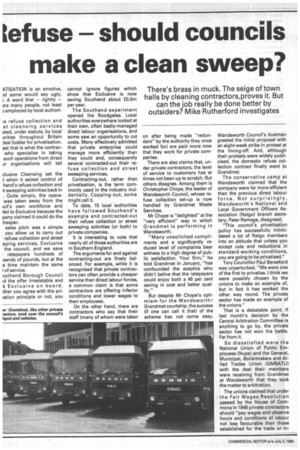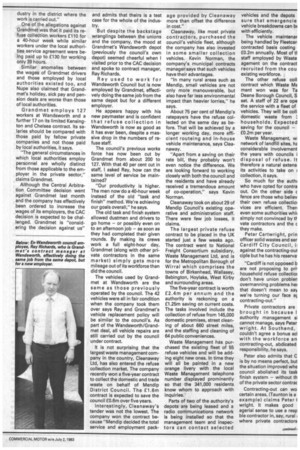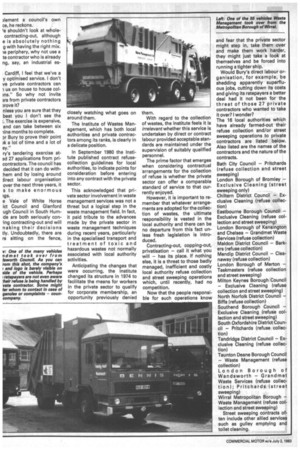lefuse should councils make a clean sweep?
Page 60

Page 61

Page 62

If you've noticed an error in this article please click here to report it so we can fix it.
There's brass in muck. The seige of town halls by cleaning contractors,proves it. But can the job really be done better by outsiders? Mike Rutherford investigates
ATISATION is an emotive, ml some would say ugly, I. A word that — rightly — ars many people, not least employed by local authori
le refuse collection and et cleansing services ated, under statute, by local arities throughout Britain Jeal fodder for privatisation. ast that is what the contracwho specialise in taking such operations from direct J r organisations will tell
clusive Cleansing set the I when it seized control of hend's refuse collection and q sweeping activities back in . Quite simply, the operawas taken away from the la's own workforce and led to Exclusive because the pany claimed it could do the :heaper.
sales pitch was a simple you allow us to carry out • refuse collection and street eping services, Exclusive the council, and we save
• ratepayers hundreds of sands of pounds, but at the e time maintain the same I of service.
)uthend Borough Council id the offer irresistable and k Exclusive on board. ther you agree with the priration principle or not, you cannot ignore figures which show that Exclusive is now saving Southend about £0.5m per year.
The Southend experiment opened the floodgates. Local authorities everywhere looked at their own, often badly-managed direct labour organisations, and some saw an opportunity to cut costs. Many effectively admitted that private enterprise could manage more efficiently than they could and, consequently several contracted-out their refuse collection and street sweeping services.
Contracting-out, rather than privatisation, is the term commonly used in the industry incidentally. Copping-out, some might call it.
To date, 15 local authorities have followed Southend's example and contracted-out their refuse collection or street sweeping activities (or both) to private companies.
It is interesting to note that nearly all of those authorities are in Southern England.
The arguments for and against contracting-out are finely balanced. For example, while it is recognised that private contractors can often provide a cheaper service than direct labour forces, a common claim is that some contractors are offering inferior conditions and lower wages to their employees.
On the other hand, there are contractors who say that their staff (many of whom were taken on after being made "redundant" by the authority they once worked for) are paid more now that they work for private companies.
There are also claims that, under private contractors, the level of service to customers has at times not been up to scratch. But others disagree. Among them is Christopher Chope, the leader of Wandsworth Council, whose refuse collection set-up is now handled by Grandmet Waste Services.
Mr Chope is "delighted" at the "very efficient" way in which Grandmet is performing in Wandsworth.
"Many unsolicited compliments and a significantly reduced level of complaints bear witness to a high degree of public satisfaction. Your firm," he told Grandmet in January, "has confounded the sceptics who didn't belive that the ratepayers could enjoy both a 45 per cent
saving in cost and better quality."
But despite Mr Chope's optimism for the Wandsworth/ Grandmet courtship, the success (if one can call it that) of the scheme has not come easy. Wandsworth Council's dustmen greeted the initial proposal with an eight-week strike in protest at the hiving-off. And, although their protests were widely publicised, the domestic refuse collection contract finally went to Grandmet.
The conservative camp at Wandsworth claimed that the company were far more efficient than the previous direct labour force. Not surprisingly, Wandsworth's National and Local Government Officers Association (Nalgo) branch secretary, Peter Ramage, disagreed.
"This council's privatisation policy has successfully intimidated a lot of Nalgo members into an attitude that unless you accept cuts and reductions in standard working conditions, you are going to be privatised."
Tory Councillor Paul Berseford was unperturbed. "We were one of the first to privatise. I think we were possibly chosen by the unions to make an example of, but in fact it has worked the other way roundThe private sector has made an example of the unions."
That is a debatable point. If last month's decision by the Central Arbitration Committee is anything to go by, the private sector has not won the battle. Far from it.
So dissatisfied were the National Union of Public Employees (Nupe) and the General, Municipal, Boilermakers and Allied Trades Union (GMBATU) with the deal their members were receiving from Grandmet at Wandsworth that they took the matter to arbitration.
The unions claimed that under the Fair Wages Resolution passed by the House of Commons in 1946 private contractors should "pay wages and observe hours and conditions of labour not less favourable than those established for the trade or in dustry in the district where the work is carried out."
One of the allegations against Grandmet was that it paid its refuse collection workers £110 for a 40-hour week while similar workers under the local authorities service agreement were being paid up to £130 for working only 39 hours.
Similar anomalies between the wages of Grandmet drivers and those employed by local authorities existed too, and Nupe also claimed that Grandmet's holiday, sick pay and pension deals are worse than those of local authorities.
Grandmet employs 1 2 7 workers at Wandsworth and a further 17 on its limited Kensington and Chelsea contract. Its salaries should be compared with those paid by fellow private companies and not those paid by local authorities, it says.
"The general circumstances in which local authorities employ personnel are wholly distinct from those applicable to the employer in the private sector," claims Grandmet.
Although the Central Arbitration Committee decision went against Grandmet last month and the company has effectively been ordered to increase the wages of its employers, the CAC decision is expected to be challenged. Grandmet is "considering the decision against us" and admits that theirs is a test case for the whole of the industry.
But despite the backstage wranglings between the unions and the company, the mood at Grandmet's Wandsworth depot (previously the council's own depot) seemed cheerful when I visited prior to the CAC decision and spoke to contract manager, Ray Richards.
Ray used to work for Wandsworth Council but is now employed by Grandmet, effectively doing the same job from the same depot but for a different employer.
He appears happy with his new paymaster and is confident that refuse collection in Wandsworth is now as good as it has ever been, despite a massive drop in the numbers of refuse staff.
The council's previous works force has now been cut by Grandmet from about 200 to 127. With that 40 per cent cut in staff, I asked Ray, how can the same level of service be maintained?
"Our productivity is higher. The men now do a 40-hour week instead of the old "task and finish" method. We're achieving our goals overall," he says.
The old task and finish system allowed dustmen and drivers to go home — or possibly even on to an afternoon job — as soon as they had completed their given rounds. By making its crews work a full eight-hour day, Grandmet (along with other private contractors in the same market) simply gets more mileage out of its workforce than did the council.
The vehicles used by Grandmet at Wandsworth are the same as those previously operated by the council. The 42 vehicles were all in fair condition when the company took them over says Ray and Grandmet's vehicle replacement policy will be similar to the council's. As part of the Wandsworth/Grandmet deal, all vehicle repairs are still carried out by the council under contract.
It is not surprising that the largest waste management company in the country, Cleanaway Ltd, has also entered the refuse collection market. The company recently won a five-year contract to collect the domestic and trade waste on behalf of Mendip District Council. The £1.6m contract is expected to save the council £0.6m over five years.
Interestingly, Cleanaway's tender was not the lowest. The company won the contract because "Mendip decided the total service and employment pack
age provided by Cleanaway more than offset the difference in cost."
Cleanaway, like most private contractors, purchased the council's vehicle fleet, although the company has also invested in some smaller collection vehicles. Kevin Norman, the company's municipal contracts manager says that such vehicles have their advantages.
"In many rural areas such as Mendip, small vehicles are not only more maneuverable, but also have far less environmental impact than heavier lorries," he says.
About 75 per cent of Mendip's ratepayers have the refuse collected on the same day as before. That will be achieved by a longer working day, more efficient routeing and in-house vehicle maintenance, says Cleanaway.
"Apart from a saving on their rate bill, they probably won't even notice the difference. We are looking forward to working closely with both the council and the residents and have already received a tremendous amount of co-operation," says Kevin Norman.
Cleanaway took on about 29 of Mendip Council's existing operative and administration staff. There were few job losses, it claims.
The largest private refuse contract to be placed in the UK started just a few weeks ago. The contract went to National Freight Consortium subsidiary, Waste Management Ltd, and is for the Metropolitan Borough of Wirral which comprises the towns of Birkenhead, Wallasey, Bebington, Hoylake, West Kirby and surrounding areas.
The five-year contract is worth £2.4m per annum and the authority is reckoning on a £1.25m saving on current costs. The tasks involved include the collection of refuse from 145,000 domestic premises, street cleaning of about 660 street miles, and the staffing and cleaning of 64 public conveniences.
Waste Management has purchased the existing fleet of 55 refuse vehicles and will be adding eight new ones. In time they will all be painted in a new orange livery with the local Waste Management telephone number displayed prominently so that the 341,000 residents know whom to approach with inquiries.
Parts of two of the authority's depots are being leased and a radio communications network is being installed so that the management team and inspectors can contact selected vehicles and the depots sure that emergencie vehicle breakdowns can IN with efficiently.
The vehicle maintenar being handled by Fleetcar contracted basis costing 0.2m annually. Most of ti staff employed by Waste agement on the contract recruited from the cou existing workforce.
The other refuse coil contract which Waste Ma ment won was for Ta Deane Borough Council, S set. A staff of 22 are ope the service with a fleet of vehicles. They will be coif domestic waste from households. Expected saving for the council — £0.2m per year.
Waste Management, wi network of landfill sites, he considerable involvement the years with councils i disposal of refuse. It therefore a natural extens its activities to take on collection, it says.
So much for the autht who have opted for contra out. On the other side fence are those who believ their own refuse collectioi vices are efficient. Then even some authorities whit simply not convinced by ti vete contractors and the c they make.
Peter Cartwright, prin officer solid wastes and ser Cardiff City Council, i: against the contracting-out ciple but he has his reserve.
"Cardiff is not opposed b are not proposing to pri, household refuse collectiol don't have union problen overmanning problems het that doesn't mean to sav we're turning our face ac contracting-out."
Private contractors are brought in because I authority management si cannot manage, says Peter wright. At Southend, couldn't agree a bonus scl with the workforce an contracting-out, abdicated responsibility, he says.
Peter also admits that C is by no means perfect, but the situation improved whe council abolished its task finish system — without th of the private sector contra( Contracting-out can we certain areas, (Taunton is a example) claims Peter wright. It makes good agerial sense to use a resp ble contractor in, say, rural where private contractors )Iement a council's own ce, he reckons.
re shouldn't look at wholecontracting-out, although e is absolutely nothing g with having the right mix. le periphery, why not use a te contractor who is already ng, say, an industrial es Cardiff, I feel that we've a y optimised service. I don't ve private contractors can 1 us on house to house col)(Is." So why not invite ars from private contractors )rove it?
nless you are sure that they beat you I don't see the The exercise is expensive, and can take between six line months to complete.
Dr Bury to prove their point )1( a lot of time and a lot of ry• 's tendering exercise at
ad 27 applications from pricontractors. The council has decided that it can do withhem and by losing around iirect labour organisation over the next three years, it s to make enormous 1gs.
e Vale of White Horse ict Council and Glanford ugh Council in South Humde are both seriously coning contracting-out and will flaking their decisions tly. Undoubtedly, there are rs sitting on the fence, closely watching what goes on around them.
The Institute of Wastes Management, which has both local authorities and private contractors among its ranks, is clearly in a delicate position.
In September 1980 the Institute published contract refusecollection guidelines for local authorities, to indicate points for consideration before entering into any contract with the private sector.
This acknowledged that private sector involvement in waste management services was not a threat but a logical step in the waste management field. In fact, it paid tribute to the advances made by the private sector in waste management techniques during recent years, particularly in the specialised transport and treatment of toxic and hazardous wastes not normally associated with local authority activities.
Anticipating the changes that were occurring, the institute changed its structure in 1974 to facilitate the means for workers in the private sector to qualify for corporate membership, an opportunity previously denied them.
With regard to the collection of wastes, the Institute feels it is irrelevant whether this service is undertaken by direct or contract labour provided acceptable standards are maintained under the supervision of suitably qualified personnel.
The prime factor that emerges when considering contractual arrangements for the collection of refuse is whether the private sector can offer a comparable standard of service to that currently enjoyed.
However, it is important to remember that whatever arrangements are adopted for the collection of wastes, the ultimate responsibility is vested in the local authority and there can be no departure from this fact unless fresh legislation is introduced.
Contracting-out, copping-out, privatisation — call it what you will — has its place. If nothing else, it is a threat to those badly managed, inefficient and costly local authority refuse collection and street sweeping operations which, until recently, had no competition.
Now that the people responsible for such operations know and fear that the private sector might step in, take them over and make them work harder, they might just take a look at themselves and be forced into running a tighter ship.
Would Bury's direct labour organisation, for example, be shedding apparently superfluous jobs, cutting down its costs and giving its ratepayers a better deal had it not been for the threat of those 27 private contractors who wanted to take it over? I wonder?
The 16 local authorities which have already farmed-out their refuse collection and/or street sweeping operations to private contractors are listed below. Also listed are the names of the contractors and the nature of the contracts.
Bath City Council — Pritchards (refuse collection and street sweeping) London Borough of Bromley — Exclusive Cleaning (street sweeping only) Chiltern District Council — Exclusive Cleaning (refuse collection) Eastbourne Borough Council — Exclusive Cleaning (refuse collection and street sweeping) London Borough of Kensington and Chelsea — Grandmet Waste Services (refuse collection) Maldon District Council — Barkers (refuse collection) Mendip District Council — Cleanaway (refuse collection) London Borough of Merton — Taskmasters (refuse collection and street sweeping) Milton Keynes Borough Council — Exclusive Cleaning (refuse collection and street sweeping) North Norfolk District Council — Biffa (refuse collection) Southend Borough Council — Exclusive Cleaning (refuse collection and street sweeping) South Oxfordshire District Council — Pritchards (refuse collection) Tandridge District Council — Exclusive Cleaning (refuse collection) Taunton Deane Borough Council — Waste Management (refuse collection) London Borough of Wandsworth — Grandmet Waste Services (refuse collection); Pritchards (street sweeping) Wirral Metropolitan Borough — Waste Management (refuse collection and street sweeping) Street sweeping contracts often include other allied services such as gulley emptying and toilet cleaning.




































































































